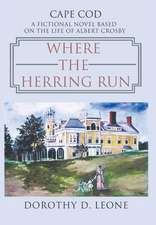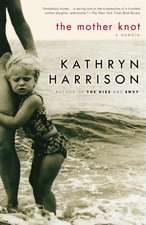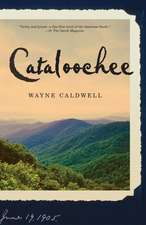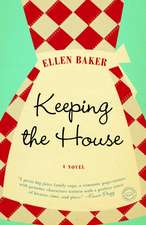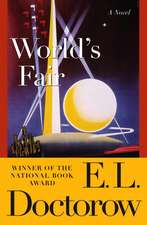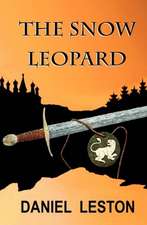The Seal Wife
Autor Kathryn Harrisonen Limba Engleză Paperback – 30 apr 2003
A novel of passions both dangerous and generative, The Seal Wife explores the nature of desire and its ability to propel an individual beyond himself and outside convention. Kathryn Harrison brilliantly re-creates the Alaskan frontier during the period of the First World War as she explores with deep understanding the interior landscape of the human psyche—a landscape eerily continuous with the splendor and terror of the frozen frontier and the storms that blow over the earth and its face.
Preț: 84.35 lei
Nou
Puncte Express: 127
Preț estimativ în valută:
16.14€ • 16.85$ • 13.33£
16.14€ • 16.85$ • 13.33£
Carte disponibilă
Livrare economică 25 martie-08 aprilie
Preluare comenzi: 021 569.72.76
Specificații
ISBN-13: 9780812968453
ISBN-10: 081296845X
Pagini: 248
Dimensiuni: 132 x 207 x 14 mm
Greutate: 0.19 kg
Editura: Random House Trade
ISBN-10: 081296845X
Pagini: 248
Dimensiuni: 132 x 207 x 14 mm
Greutate: 0.19 kg
Editura: Random House Trade
Notă biografică
Kathryn Harrison est une professionnelle canadienne devenue artiste qui combine des formations et des expériences professionnelles en science, marketing et art. Elle a obtenu un baccalauréat en sciences et une maîtrise en marketing. Elle a ensuite travaillé en tant que spécialiste des communications pendant plus de dix ans, au cours desquels elle a perfectionné ses talents en écriture, puis elle a obtenu un diplôme en beaux-arts auprès de la Toronto School of Art. Depuis, elle travaille en tant que graphiste. Pour créer son livre illustré Des mauvaises herbes dans le jardin de Mamie, Kathryn a tiré profit de toutes ses compétences. Motivée par son expérience personnelle lors de la maladie de sa mère, Kathryn a pour but d'aider à soutenir les familles et à faire connaître la maladie d'Alzheimer et les autres démences dégénératives. C'est ce qu'elle s'efforce de faire en travaillant sans relâche dans son studio de Cobourg, une petite ville près de Toronto, en Ontario, Canada, où ses enfants, ses chats et la superbe nature environnante sont une source d'inspiration quotidienne.
Extras
HE IS TWENTY-SIX, and for as long as he’s lived in the north there has been only the Aleut woman. Several evenings a week he comes to her door with a duck or a rabbit and she asks him in. Not asks, exactly. She opens the door and steps aside so he can enter.
She lives in a frame house hammered together fast out of boards and tar paper, a house like all the others in Anchorage, except it isn’t on First or Fourth or even Ninth Street; instead it is off to the east, marooned on the mud flats. But she has things in it, like anyone else, a table and two chairs, flour and tea on a shelf, a hat hanging from a peg. She wears a dress with buttons and she cooks at a stove, and the two of them eat before, and then after she sits cross-legged in the tub and smokes her pipe.
She smokes, and he watches her smoke. He thinks her mouth may be the most beautiful part of her—not red, not brown or mauve or pink, but a color for which he has no name. Her top lip is finely drawn, almost stern; the bottom one is plump, with a crease in the center. On another face its fullness might be considered a pout, but her black eyes convey none of the disappointment, nor the invitation, of such an expression.
She is the only woman who has allowed him to watch her as intently, as much and as long, as he wants, and the reason for this comes to him one night. She is self-possessed. There is nothing he can take from her by looking.
At the thought, he gets up from the bed and goes to the window, he rests his forehead on its cold pane. She possesses herself. How much more this makes him want her!
Then, one day, it’s over: she won’t open her door to him.
He knocks, he rattles the knob. “Please,” he says, his mouth against the crack. “Open up. It’s me.” With his hands cupped around his eyes, he peers through the window and there she is, sitting at the table, staring at the wall.
He knocks on the glass and holds up his rabbit, but she doesn’t turn her head. Even after he’s walked the entire peri- meter of the two-room house, hitting the boards with the heel of his hand, even after that, when he looks in the window, he sees her still sitting there, not moving. He leaves his dead rabbit on the ground and goes back the way he came, trudging past the railroad yard and the new bunkhouse, the sawmill with its chained curs lunging and snapping after his shadow. What. He thinks the word over and over. There must be some explanation. But what?
It’s June, eleven o’clock at night and bright as morning. The usually gray water of the inlet is purple, gold where the light touches it, a low skein of cirrus unraveling on the horizon. Beyond the trampled mud of the streets are wildflowers growing everywhere, flowers of all colors, red fireweed, yellow broom, blue aster. He picks them as he walks. Preoccupied, he yanks at them, and some come up roots and all. After smelling their bright heads, he drops them, and by the time he retraces his path their petals have withered.
Has he done something to offend her? In his mind he reviews his last visit with the woman. He brought her a duck, a good-size one, and a bolt of netting to protect her bed. Surely there was nothing wrong in that. He can’t stand being bitten by mosquitoes, and he hates for the two of them to have to leave their clothing on. Every hour he’s not with her is one spent waiting to see her, the more of her the better. She has the sloping shoulders characteristic of her people; breasts that are small and pointed, like two halves of a yam set side by side; three black lines tattooed on her chin; and smooth, bowed legs. She, he calls her to himself, because he hasn’t presumed to name her, not even privately. Her hair is long and black, a mare’s tail, and once, when he began to unbraid it, she took it from his hands. By some accident of biology her navel turned out a perfect spiral, and he’s fought off her hands to kiss her in that place.
Her body seems young to him, as young as his own, as strong and unmarked. But her eyes make him wonder.
There’s no point in asking her age, because she doesn’t understand English, nor any of the pidgin phrases he’s taught himself and tried to say.
Or perhaps she does know the meaning of his words but is unwilling to betray her knowledge—herself—to him.
Whether she understood him or not, the woman’s silence did not stop him from talking; it provoked him, and he spoke more volubly to her than he had to anyone else, more than he might to a person who answered. His father was dead, he told her, and his mother and sister ran a boardinghouse in St. Louis. He’d lived in three cities so far: St. Louis, where he was born; Chicago, where he attended the university and earned a degree in mathematics; and Seattle, where he worked for two years as an observer for the Weather Bureau. Well, Seattle wasn’t much of a city, he guessed, shaking his head. But compared to Anchorage.
When he talked she stopped what she was doing and watched him, and sometimes he could see himself, reflected on the wet surface of her eyes, and forgot what he had been saying. Oh, yes, he’d come north for the government land auction and he’d built the weather station from the same green lumber from which her house was made. But while she had only one window, he had windows all around. If she’d come outside with him, come with him to his station house, she’d see that the panes were six feet wide and as thick as this. To illustrate, he held his thumb and forefinger an inch apart. But the woman, who allowed him to enter whenever he pleased, would not follow him so much as a foot beyond her door, and so they never walked together, never even stepped outside to watch the birds fly overhead.
Because it is his vocation, he often spoke to her of weather and its measurement. He is building a kite, a box kite as big as her bedroom, and to show her he paced off its dimensions. It will go up for miles and tell him what he can’t determine from instruments on the ground.
There are tornadoes in Missouri, he told her, his finger stirring the air before her face, and he told her that as a child he walked through fields sown with shards of his grandmother’s plates. A storm took and emptied her cupboards, carried off spoons and bowls and jars of peaches, and spun them over rivers and across roads, clear into the next county. “What do you think of that?” he said.
In Alaska, he’d traveled as far north as Talkeetna; he went with a trapper who accepted ten silver dollars to serve as his guide. The journey inland took three weeks, but coming back the wind picked up, and the trapper stuck a sail on his sled. They whistled down the frozen river, his ears singing with cold inside his parka hood, and he tried to keep his eyes open, because what he saw was not like anything he’d seen before: pink snow and blue forest, the kind of thing you expect in a dream but not while awake.
“Bigelow,” he said, pointing to himself, clapping his hand on his chest, but he couldn’t get her to repeat his name.
“Promise me something,” he said. They were sitting side by side on her bed, dressed only in their boots, and when he stroked her knee, she looked down at his hand. In his mind, Bigelow ran through women—girls—he’d known. Karen, to whom he’d written a letter each day; Molly, very pretty, often looking past him to find her own reflection; Rachel, too tall, but it hadn’t really mattered; Anne, reading a novel. They seemed even farther from him than the cities where they lived, and it was the attempt to conjure their faces that measured this distance. How tiny they were, like well-wishers waving from a shrinking dock.
Five days to sail north from Seattle. Bigelow disembarked in Anchorage, and by the time he’d thought to turn himself around and look back toward the ship that had brought him, it was gone. Anchorage—a place for ships to pause, to drop anchor for only as long as it might take to disgorge freight and passengers. To fill their holds with otter, mink, and sable, skins so fresh they still bled, packed in salt to keep them from spoiling.
“Promise me there’s no one else.”
This time he whispered the words, and the woman looked at him. She frowned and she put her fingers to her lips. The knuckles were so smooth, so sleek, that he wondered if northern people weren’t, like the animals, insulated against the cold by a layer of yellow, silky fat. . . . October November December. January February March. April May. Half of June. Long enough for him to begin to take it for granted: he would knock, she would open.
Whatever else occupies him, Bigelow’s thoughts return to the Aleut woman. He imagines their reunion, his passionate reentry into her house, into her arms, her body. But these fantasies don’t get as far as the bed, the bed piled with skins. They’re interrupted by the picture he has of her, sitting, staring, her hands folded in her lap, her thick black braid hanging over one shoulder.
Panicked—what’s to become of him, what will he do? what will he do if she continues to refuse to see him?—he forces himself to let a day pass, and then another. He makes himself wait for what seems to him a long time, enough time for a woman to recover from whatever has upset her. Then he returns to her door.
But he finds it unlocked and inside her house nothing, just a pale spot on the floorboards where her bed used to be, and another under the missing stove. In one corner is his gramophone and, stacked neatly in their glassine envelopes, the Caruso and Tetrazzini recordings that he cranked the handle to play for her.
He walks around her two rooms. He runs his fingers along the walls until he comes to the place where she tacked up an illustrated advertisement for corsets, the fourteen styles available from the American Corset Company in Dayton, Ohio. Why she put it up or what she thought of it he cannot guess.
He stares at the advertisement, touches it, mouthing the names of the styles—Delineator, Posture Fix, Widow-Maker. He turns and with his back against the wall, he slides down, staring from one empty room into the other. He starts to cry, stops himself when he hears the choked noise he is making in the silence of her house. So small, so inadequate for the grief he feels.
From the Hardcover edition.
She lives in a frame house hammered together fast out of boards and tar paper, a house like all the others in Anchorage, except it isn’t on First or Fourth or even Ninth Street; instead it is off to the east, marooned on the mud flats. But she has things in it, like anyone else, a table and two chairs, flour and tea on a shelf, a hat hanging from a peg. She wears a dress with buttons and she cooks at a stove, and the two of them eat before, and then after she sits cross-legged in the tub and smokes her pipe.
She smokes, and he watches her smoke. He thinks her mouth may be the most beautiful part of her—not red, not brown or mauve or pink, but a color for which he has no name. Her top lip is finely drawn, almost stern; the bottom one is plump, with a crease in the center. On another face its fullness might be considered a pout, but her black eyes convey none of the disappointment, nor the invitation, of such an expression.
She is the only woman who has allowed him to watch her as intently, as much and as long, as he wants, and the reason for this comes to him one night. She is self-possessed. There is nothing he can take from her by looking.
At the thought, he gets up from the bed and goes to the window, he rests his forehead on its cold pane. She possesses herself. How much more this makes him want her!
Then, one day, it’s over: she won’t open her door to him.
He knocks, he rattles the knob. “Please,” he says, his mouth against the crack. “Open up. It’s me.” With his hands cupped around his eyes, he peers through the window and there she is, sitting at the table, staring at the wall.
He knocks on the glass and holds up his rabbit, but she doesn’t turn her head. Even after he’s walked the entire peri- meter of the two-room house, hitting the boards with the heel of his hand, even after that, when he looks in the window, he sees her still sitting there, not moving. He leaves his dead rabbit on the ground and goes back the way he came, trudging past the railroad yard and the new bunkhouse, the sawmill with its chained curs lunging and snapping after his shadow. What. He thinks the word over and over. There must be some explanation. But what?
It’s June, eleven o’clock at night and bright as morning. The usually gray water of the inlet is purple, gold where the light touches it, a low skein of cirrus unraveling on the horizon. Beyond the trampled mud of the streets are wildflowers growing everywhere, flowers of all colors, red fireweed, yellow broom, blue aster. He picks them as he walks. Preoccupied, he yanks at them, and some come up roots and all. After smelling their bright heads, he drops them, and by the time he retraces his path their petals have withered.
Has he done something to offend her? In his mind he reviews his last visit with the woman. He brought her a duck, a good-size one, and a bolt of netting to protect her bed. Surely there was nothing wrong in that. He can’t stand being bitten by mosquitoes, and he hates for the two of them to have to leave their clothing on. Every hour he’s not with her is one spent waiting to see her, the more of her the better. She has the sloping shoulders characteristic of her people; breasts that are small and pointed, like two halves of a yam set side by side; three black lines tattooed on her chin; and smooth, bowed legs. She, he calls her to himself, because he hasn’t presumed to name her, not even privately. Her hair is long and black, a mare’s tail, and once, when he began to unbraid it, she took it from his hands. By some accident of biology her navel turned out a perfect spiral, and he’s fought off her hands to kiss her in that place.
Her body seems young to him, as young as his own, as strong and unmarked. But her eyes make him wonder.
There’s no point in asking her age, because she doesn’t understand English, nor any of the pidgin phrases he’s taught himself and tried to say.
Or perhaps she does know the meaning of his words but is unwilling to betray her knowledge—herself—to him.
Whether she understood him or not, the woman’s silence did not stop him from talking; it provoked him, and he spoke more volubly to her than he had to anyone else, more than he might to a person who answered. His father was dead, he told her, and his mother and sister ran a boardinghouse in St. Louis. He’d lived in three cities so far: St. Louis, where he was born; Chicago, where he attended the university and earned a degree in mathematics; and Seattle, where he worked for two years as an observer for the Weather Bureau. Well, Seattle wasn’t much of a city, he guessed, shaking his head. But compared to Anchorage.
When he talked she stopped what she was doing and watched him, and sometimes he could see himself, reflected on the wet surface of her eyes, and forgot what he had been saying. Oh, yes, he’d come north for the government land auction and he’d built the weather station from the same green lumber from which her house was made. But while she had only one window, he had windows all around. If she’d come outside with him, come with him to his station house, she’d see that the panes were six feet wide and as thick as this. To illustrate, he held his thumb and forefinger an inch apart. But the woman, who allowed him to enter whenever he pleased, would not follow him so much as a foot beyond her door, and so they never walked together, never even stepped outside to watch the birds fly overhead.
Because it is his vocation, he often spoke to her of weather and its measurement. He is building a kite, a box kite as big as her bedroom, and to show her he paced off its dimensions. It will go up for miles and tell him what he can’t determine from instruments on the ground.
There are tornadoes in Missouri, he told her, his finger stirring the air before her face, and he told her that as a child he walked through fields sown with shards of his grandmother’s plates. A storm took and emptied her cupboards, carried off spoons and bowls and jars of peaches, and spun them over rivers and across roads, clear into the next county. “What do you think of that?” he said.
In Alaska, he’d traveled as far north as Talkeetna; he went with a trapper who accepted ten silver dollars to serve as his guide. The journey inland took three weeks, but coming back the wind picked up, and the trapper stuck a sail on his sled. They whistled down the frozen river, his ears singing with cold inside his parka hood, and he tried to keep his eyes open, because what he saw was not like anything he’d seen before: pink snow and blue forest, the kind of thing you expect in a dream but not while awake.
“Bigelow,” he said, pointing to himself, clapping his hand on his chest, but he couldn’t get her to repeat his name.
“Promise me something,” he said. They were sitting side by side on her bed, dressed only in their boots, and when he stroked her knee, she looked down at his hand. In his mind, Bigelow ran through women—girls—he’d known. Karen, to whom he’d written a letter each day; Molly, very pretty, often looking past him to find her own reflection; Rachel, too tall, but it hadn’t really mattered; Anne, reading a novel. They seemed even farther from him than the cities where they lived, and it was the attempt to conjure their faces that measured this distance. How tiny they were, like well-wishers waving from a shrinking dock.
Five days to sail north from Seattle. Bigelow disembarked in Anchorage, and by the time he’d thought to turn himself around and look back toward the ship that had brought him, it was gone. Anchorage—a place for ships to pause, to drop anchor for only as long as it might take to disgorge freight and passengers. To fill their holds with otter, mink, and sable, skins so fresh they still bled, packed in salt to keep them from spoiling.
“Promise me there’s no one else.”
This time he whispered the words, and the woman looked at him. She frowned and she put her fingers to her lips. The knuckles were so smooth, so sleek, that he wondered if northern people weren’t, like the animals, insulated against the cold by a layer of yellow, silky fat. . . . October November December. January February March. April May. Half of June. Long enough for him to begin to take it for granted: he would knock, she would open.
Whatever else occupies him, Bigelow’s thoughts return to the Aleut woman. He imagines their reunion, his passionate reentry into her house, into her arms, her body. But these fantasies don’t get as far as the bed, the bed piled with skins. They’re interrupted by the picture he has of her, sitting, staring, her hands folded in her lap, her thick black braid hanging over one shoulder.
Panicked—what’s to become of him, what will he do? what will he do if she continues to refuse to see him?—he forces himself to let a day pass, and then another. He makes himself wait for what seems to him a long time, enough time for a woman to recover from whatever has upset her. Then he returns to her door.
But he finds it unlocked and inside her house nothing, just a pale spot on the floorboards where her bed used to be, and another under the missing stove. In one corner is his gramophone and, stacked neatly in their glassine envelopes, the Caruso and Tetrazzini recordings that he cranked the handle to play for her.
He walks around her two rooms. He runs his fingers along the walls until he comes to the place where she tacked up an illustrated advertisement for corsets, the fourteen styles available from the American Corset Company in Dayton, Ohio. Why she put it up or what she thought of it he cannot guess.
He stares at the advertisement, touches it, mouthing the names of the styles—Delineator, Posture Fix, Widow-Maker. He turns and with his back against the wall, he slides down, staring from one empty room into the other. He starts to cry, stops himself when he hears the choked noise he is making in the silence of her house. So small, so inadequate for the grief he feels.
From the Hardcover edition.
Recenzii
“Mesmerizing...harrowing in its emotional intensity, haunting in its evocation of a distant time and place.” —Michiko Kakutani, The New York Times
“Superb, perfect, one might even say—soaring.” —The Seattle Times
“Lyrical passages...reads like profound poetry...the most enterprising and successful portrait of a man in heat by a female writer since Joyce Carol Oates’ tumultuously orgasmic What I Lived For.” —Alan Cheuse, Chicago Tribune
“Intricately wrought...Harrison imbues her solitary silence with a stately air of self-possession.” —Maria Russo, The New York Times Book Review
“This...mesmerizing tale is dizzying in intensity; its startling story twists are borne along by prose as austere and powerful as Alaska’s icescape. The novel’s undertow of anguish will resonate with anyone who has tried to make sense of desire....Chilled to perfection.” —People
“Superb, perfect, one might even say—soaring.” —The Seattle Times
“Lyrical passages...reads like profound poetry...the most enterprising and successful portrait of a man in heat by a female writer since Joyce Carol Oates’ tumultuously orgasmic What I Lived For.” —Alan Cheuse, Chicago Tribune
“Intricately wrought...Harrison imbues her solitary silence with a stately air of self-possession.” —Maria Russo, The New York Times Book Review
“This...mesmerizing tale is dizzying in intensity; its startling story twists are borne along by prose as austere and powerful as Alaska’s icescape. The novel’s undertow of anguish will resonate with anyone who has tried to make sense of desire....Chilled to perfection.” —People
Descriere
A stunning and hypnotic novel by "a writer of extraordinary gifts" (Tobias Wolff), "The Seal Wife" tells the story of a young scientist and his consuming love for a woman known as the Aleut, a woman who refuses to speak.



